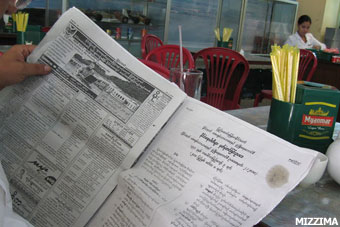In Burma, newspapers are often mainly useful for ordinary citizens to read the obituaries. Accordingly, when there is a chance to pick up a paper, they flip quickly to the back pages with little interest in what else is going on...
In Burma, newspapers are often mainly useful for ordinary citizens to read the obituaries. Accordingly, when there is a chance to pick up a paper, they flip quickly to the back pages with little interest in what else is going on.
 More than 20 years ago, news from private media could be defined as gossip about celebrities like film stars and singers, which was once called Yellow Journalism in the USA. Lately, the content and subject matter of news has developed to include wider public concerns including business news and the political views of registered parties.
More than 20 years ago, news from private media could be defined as gossip about celebrities like film stars and singers, which was once called Yellow Journalism in the USA. Lately, the content and subject matter of news has developed to include wider public concerns including business news and the political views of registered parties.
There are signs of some change underway. The military government is preparing to launch a third daily newspaper, but if there is no right to information and more private daily newspapers able to compete in the marketplace, then most newspapers will remain largely filled with non-controversial topics and public relations statements issued by government agencies and PR companies.
There is almost no space for the traditional news reporting and public commentary found in the West.
Another weakness in the media structure in Burma is that public organizations are not able to utilise the media in getting their information and messages across to the public. The important role played by private institutions is almost totally lacking in Burma.
Also, there is almost no sense of what is known in the West as the role of the public servant, which if taken to the extreme, recognizes the government and all its officials as public servants.
Realistically, under the long reach of the Security Act, almost no public official would dare to respond to queries from the press, even when they are assigned to duties in the government’s public relations department. Recent inquiries about the publication of the new daily newspaper, published by the government, to be called Myawaddy were met with no response from military officials.
Everyone who closely monitors the Burmese media quickly learns of certain media quirks. Dates and deadlines for things frequently change, a common sign that people in official roles really don’t know what’s going on.
Policy changes are announced and then seemingly are taken back. For example, after the liberalization of the agricultural sector, the export of rice was banned and then lifted according to price signals in the local market. Sometimes, news articles contradict each other even when they report on the same event or topic.
One learns to read between the lines, such as some articles which try to advise the government while not openly criticizing the government’s policy. Usually, such stories mention a source called ‘anonymous’.
As long as the country suffers from the heavy hand of governmental censorship, it admits its most fundamental weakness: a fear and distrust of the people.
Until that fear disappears, there will be a place for the Burmese exiled media, which provides factual information, commentary and opinions about what goes on inside and outside the country. When that is no longer needed, it will Burma, finally, has a free press.
Zun Khaung lives in Rangoon and is a close observer of the Burmese news media and government.



